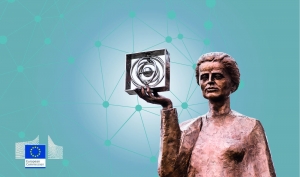4th EIPIN-Innovation Society Congress and 2nd doctoral seminar, London
> Download the EIPIN London programme 2019
Alongside the heated debates in London, at the heart of the UK which is currently getting massive attention due to Brexit, the EIPIN Innovation Society members have gathered at Queen Mary University of London to discuss some important aspects of Intellectual Property law and its developments in the multi-layered European Union legal order, covering several co-existing national, supranational and international institutions. Such a complex environment keeps academics busy, and that is the reason why the EIPIN network this time decided to dedicate its second half of the 20th EIPIN congress to the topic on Decision Making Institutions and the Evolution of Intellectual Property Law.
Before the congress took place, the early stage researchers of the EIPIN Innovation Society presented their research at the second doctoral seminar on the 3rd and 4th of April in the Centre for Commercial Law Studies of Queen Mary University of London (CCLS, QMUL). They specifically focused on the questions and challenges they face during their research, both methodological and content-related. The format of the seminar allowed for open discussions chaired by the allocated panel leader – professors within the EIPIN network. This time the ESRs were put in a reversed order starting from the number fifteen finishing with the first ESR. First day presenters were Lucius Klubočnic, Tamar Khuchua, Gerben Hartman and Natasha Mangal in the panel chaired by Prof. Josef Drexl from the Munich Intellectual Property Law Centre (MIPLC). The second panel of the day, chaired by Prof. Manuel Desantes from the University of Alicante, covered presentations by Letizia Tomada, Anastasiia Kyrylenko, Clara Ducimetiere and Naina Khanna. The second day of the doctoral seminar started with the panel of Dr. Noam Shemtov from CCLS at QMUL who gave the floor to the ESRs – Vicente Zafrilla, Francesca Mazzi, Jared Osando and Maurizio Crupi. Last but not least, the final panel was chaired by Anselm Kamperman Sanders, Professor at Maastricht University, gathering the presentations by Niccolò Galli, Girish Nagraj and Krishnamani Jayaraman. On both days, the ESRs raised rather diverse points and questions such as using the literature and existing state-of-the-art in a proper way, translating materials and encountering language barriers during the research, and fine-tuning their research topics and questions. Further issues related to empirical research were also considered, specifically issues regarding interviews, confidentiality, non-disclosure and ethics related to the data gathered from the interviews. The ESRs were given many useful pieces of advice, not only from the professors but also from each other and from the invited experts.
From the afternoon of 4th April and onwards till 6th April, the EIPIN Congress took place which traditionally gathers master students of the EIPIN network as main members of the audience, divided into groups to ask questions to the panelists. As for the speakers of the panels, this time as well, the congress was enriched by the contributions of the representatives from different universities, even coming from the US and Mexico. The topics covered at the congress were focused on the division of power between the decision-making institutions and the balancing of often conflicting interests such as, for example, on the one hand copyright and on the other hand, fundamental rights. The role of the two European courts – the Court of Justice of the European Union and the European Court of Human Rights – was something that also triggered hot discussions. In particular, considerations of the two courts´ case law by each other, the binding effect of their decisions and harmonising agenda in the EU in the field of IP pushed by the CJEU, were issues scrutinised by Prof. Geiger from Centre for International Intellectual Property Studies (CEIPI), University of Strasbourg and Prof. Peifer from the University of Cologne. The role of the European Union Intellectual Property Office was also brought to the discussions by the Judge Virginia Melgar coming from the Boards of Appeal of European Union Intellectual Property Office (BoA, EUIPO). Of course, when talking about institutions in the field of IP, the Unified Patent Court could not be left aside – Dr. McDonagh from City University London discussed the intricacies involved in the European patent litigation under the shadow of the Unified Patent Court. Other types of IP enforcement, such as private enforcement and arbitration linked with the topic of the public domain, were also debated in the presentations by Prof. Hoeren from the University of Münster, Prof. Betancourt from Universidad Autonoma de Mexico and Prof. Mimler from Bournemouth University.
Prof. Brauneis from George Washington University representing the US academia and Mr. Rinkerman, the partner of the US law firm Drinker Biddle & Reath, shed the light on some aspects developed in the US such as fair use concept in copyright field and the pros and cons of the establishment of the copyright office in the US.
Both the doctoral seminar and the congress were full of lively discussions leaving the room for further thoughts. During the four days, the participants also had the opportunity to continue their discussions in less formal environment at the evening dinners hosted in some nice venues of the city of London.
Report by Tamar Khuchua




Leave A Comment